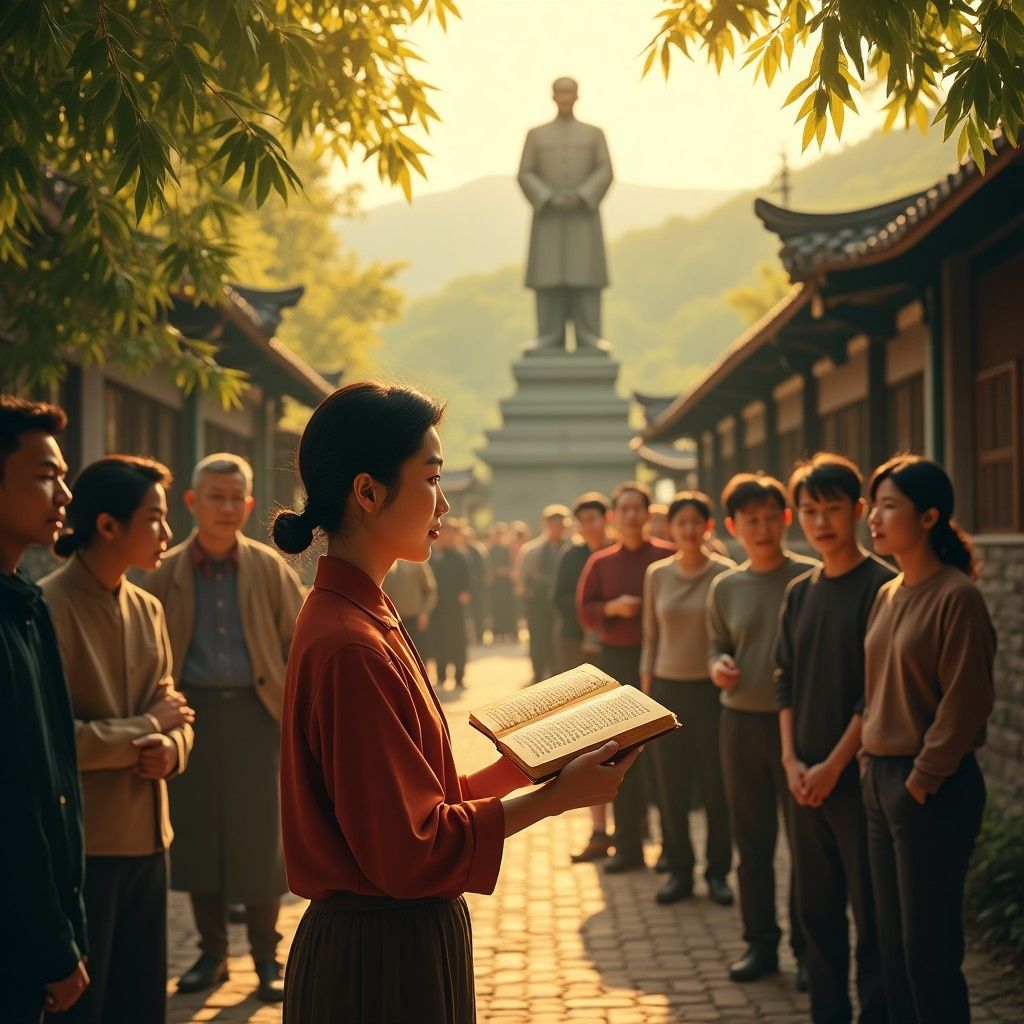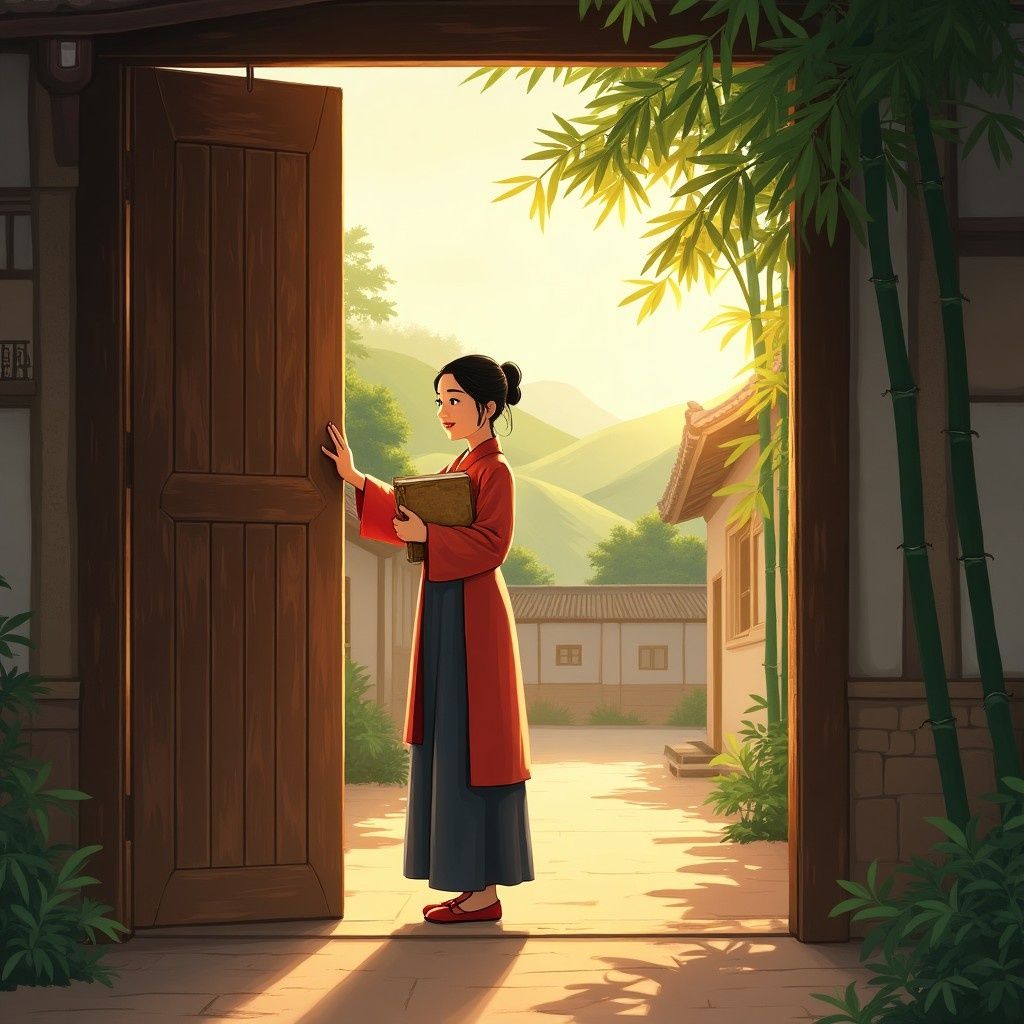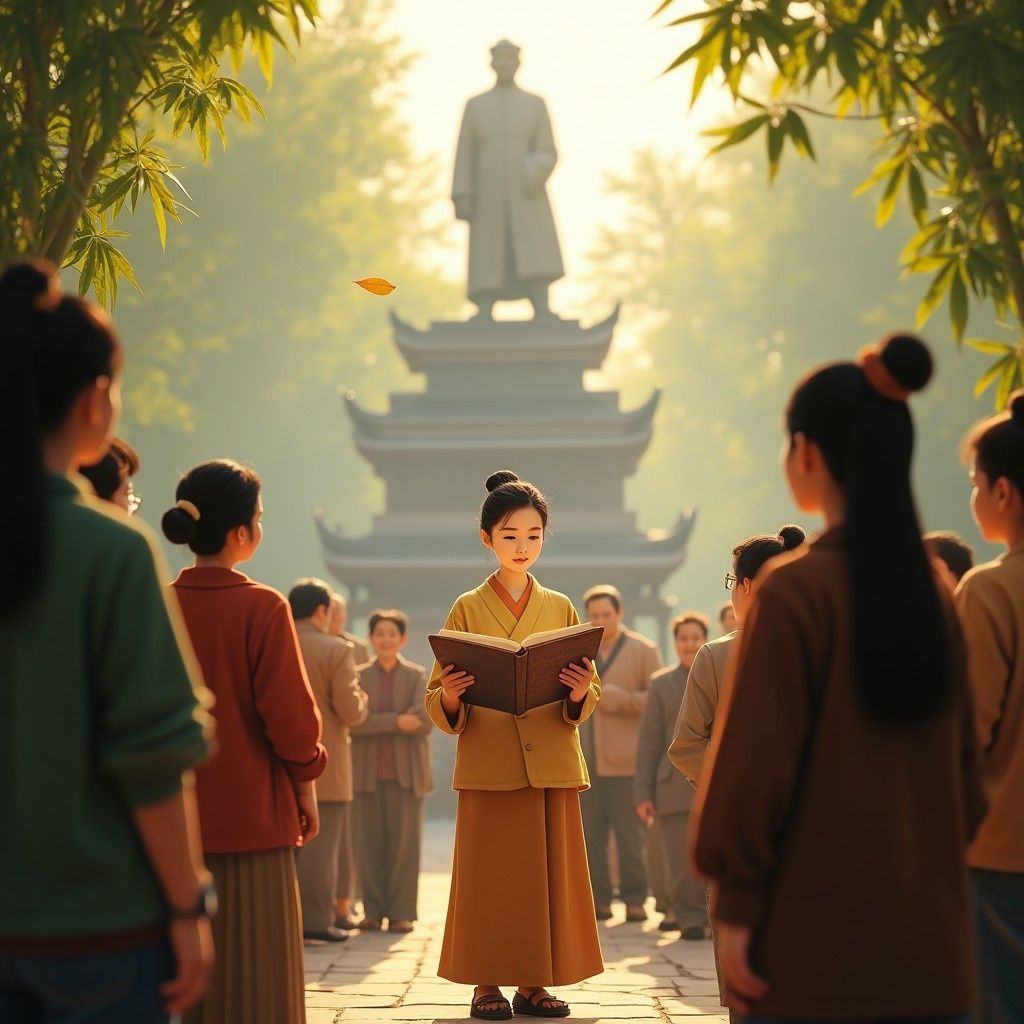**Whispers of the Past**
In the small, sun-dappled village of Willow Glen, nestled amidst the undulating hills of Sichuan, life seemed to carry on in its timeless rhythm. The bamboo groves swayed gently in the breeze, whispering secrets of a bygone era. Yet, beneath this serene facade, the scars of the Cultural Revolution lingered, etched into the hearts of its people.

Mei Lin, a woman of quiet strength and unyielding spirit, stood at the threshold of her ancestral home. Her fingers traced the worn wood of the doorframe, a tactile connection to her past. The village had changed little since she was a child, but the echoes of the "ten years of chaos" reverberated through its narrow lanes. As a young girl, Mei Lin had watched her father, a respected teacher, dragged away by the fervent Red Guards. His crime? Possessing books deemed counter-revolutionary. The memory of that day was seared into her mind—the shouts, the accusations, the cold, unfeeling eyes of those who once called him friend. Her father had never returned, swallowed by the maelstrom of ideological purges. Now, years later, Mei Lin had returned to Willow Glen, seeking closure and perhaps, a measure of peace. She carried with her a single book, its pages yellowed with age, hidden away during those tumultuous years. It was a collection of poems her father had cherished, verses that spoke of love, loss, and the enduring spirit of humanity.

As she walked through the village, familiar faces greeted her with nods and cautious smiles. The elders, who had weathered the storm of the Cultural Revolution, bore witness to the resilience of their community. They remembered the destruction of cultural relics, the public humiliations, and the loss of loved ones. Yet, they also remembered the quiet acts of defiance, the whispered words of dissent that kept hope alive. Mei Lin's journey led her to the village square, where a statue of Mao Zedong stood, a stark reminder of the past. She paused, her gaze fixed on the monument, her thoughts a turbulent sea of conflicting emotions. The Cultural Revolution had sought to erase history, to reshape the very fabric of society. But it had also left behind a legacy of pain and resilience, a testament to the indomitable human spirit. In the fading light of the afternoon, Mei Lin gathered the villagers around her. She opened the book, her father's voice echoing through the verses as she read aloud. The words flowed like a river, washing over the crowd, uniting them in shared memory and silent reflection.

As the last rays of the sun dipped below the horizon, Mei Lin closed the book, her heart lighter, her purpose clear. The Cultural Revolution had been a time of darkness, but it had also forged bonds of solidarity and strength. In the end, it was the whispers of the past that guided them, reminding them of who they were and who they could become. In Willow Glen, the bamboo groves continued to sway, their whispers a promise of renewal and hope. And as Mei Lin looked out over her village, she knew that the legacy of those tumultuous years would not be forgotten. It would live on in the stories they told, in the resilience of their hearts, and in the enduring spirit of a people who refused to be silenced.

Mei Lin, a woman of quiet strength and unyielding spirit, stood at the threshold of her ancestral home. Her fingers traced the worn wood of the doorframe, a tactile connection to her past. The village had changed little since she was a child, but the echoes of the "ten years of chaos" reverberated through its narrow lanes. As a young girl, Mei Lin had watched her father, a respected teacher, dragged away by the fervent Red Guards. His crime? Possessing books deemed counter-revolutionary. The memory of that day was seared into her mind—the shouts, the accusations, the cold, unfeeling eyes of those who once called him friend. Her father had never returned, swallowed by the maelstrom of ideological purges. Now, years later, Mei Lin had returned to Willow Glen, seeking closure and perhaps, a measure of peace. She carried with her a single book, its pages yellowed with age, hidden away during those tumultuous years. It was a collection of poems her father had cherished, verses that spoke of love, loss, and the enduring spirit of humanity.

As she walked through the village, familiar faces greeted her with nods and cautious smiles. The elders, who had weathered the storm of the Cultural Revolution, bore witness to the resilience of their community. They remembered the destruction of cultural relics, the public humiliations, and the loss of loved ones. Yet, they also remembered the quiet acts of defiance, the whispered words of dissent that kept hope alive. Mei Lin's journey led her to the village square, where a statue of Mao Zedong stood, a stark reminder of the past. She paused, her gaze fixed on the monument, her thoughts a turbulent sea of conflicting emotions. The Cultural Revolution had sought to erase history, to reshape the very fabric of society. But it had also left behind a legacy of pain and resilience, a testament to the indomitable human spirit. In the fading light of the afternoon, Mei Lin gathered the villagers around her. She opened the book, her father's voice echoing through the verses as she read aloud. The words flowed like a river, washing over the crowd, uniting them in shared memory and silent reflection.

As the last rays of the sun dipped below the horizon, Mei Lin closed the book, her heart lighter, her purpose clear. The Cultural Revolution had been a time of darkness, but it had also forged bonds of solidarity and strength. In the end, it was the whispers of the past that guided them, reminding them of who they were and who they could become. In Willow Glen, the bamboo groves continued to sway, their whispers a promise of renewal and hope. And as Mei Lin looked out over her village, she knew that the legacy of those tumultuous years would not be forgotten. It would live on in the stories they told, in the resilience of their hearts, and in the enduring spirit of a people who refused to be silenced.
The Cultural Revolution, initiated by Mao Zedong in 1966, was a decade-long sociopolitical movement in China aimed at preserving communist ideology by removing capitalist and traditional elements from society. Despite its failure to achieve its main objectives, it reinstated Mao's dominance after his political sidelining post-Great Leap Forward. The movement saw the rise of the Red Guards, who targeted intellectuals and cultural artifacts, leading to widespread chaos and violence, with an estimated death toll of 1-2 million. The aftermath saw the eventual rise of Deng Xiaoping, who implemented reforms that dismantled the Cultural Revolution's ideology, acknowledging its severe setbacks to the nation. This period, often referred to as the "ten years of chaos," left a complex legacy that continues to influence China's historical narrative.


Comments
Post a Comment